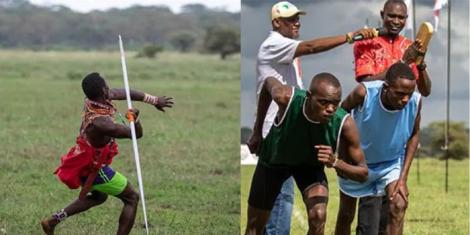
The Maasai’s are one of the most famous communities in Africa - they are globally known for their bravery and unique culture.
Traditionally, the community which is found in Kenya and Tanzania made their youthful men (moran) hunt and kill lions in order to graduate into adulthood.
Any moran who successfully killed the king of the jungle was seen as a warrior.
Today, this is not the case anymore because the Maasai people have found a new way of transiting from childhood to manhood. They are no longer hurling their well-sharpened spears at Lions as their past generations did.
Also Read: Mashiani and Taunyane: The First Africans to Participate in Olympic Games, Barefoot
Ten years ago, a group of Maasai elders (menye layiok) who were concerned about the dwindling number of lions approached Big Life Foundation, a Kenyan-based Non-Governmental Organization (NGO) and requested their support in implementing an alternative to lion-killing.
Thus, the Maasai Olympics, a revolutionary idea was born. Just like hunting and killing lions in the vast Maasai Mara Yellow Savannah, the games also offer bragging rights.
It not only gives Maasai boys a chance to display their warrior skills but the winners are also rewarded handsomely.
Every village selects their representatives via a series of tournaments before they face-off for the finals.
Some of the categories that are involved in the event which is held after every two years include 800m, 5,000m, and 200m races as well as javelin throwing and rungu ‘mace’.
Also Read: Comrades Marathon: 14 Kenyans Set to Feature in the World’s Toughest Marathon
The 2021 edition of Maasai Olympics was pushed to 2022 due to the challenges posed by the pandemic. The event which is open to the general public will be held on Saturday, December 10.
David Lekuta Rudisha, the reigning 800m world record holder once described the Maasai Olympics as an essential step in safeguarding the country's rapidly falling lion population.
"We have already seen a lot of responses. Every year, big numbers of lions were being killed but because of this event the numbers have dropped and that is a great achievement,”
“We are looking forward to continuing until there is zero killing of wildlife.” he was quoted by Reuters.
After winning the Javelin competition during the 2016 edition, Tipape Lekatoo, a 20-year-old man from Mbirikani Manyatta Village revealed that although the prize money was not enough to fund his education, he was proud about the impact the games were having in the community.
“The prize money won’t pay for my tourism management education, but I am grateful that (efforts to raise awareness) of negative vices within the community are bearing fruit,” he stated then.
Also Read: Michel Breal: The Man Who Introduced Marathon in Olympic Games
